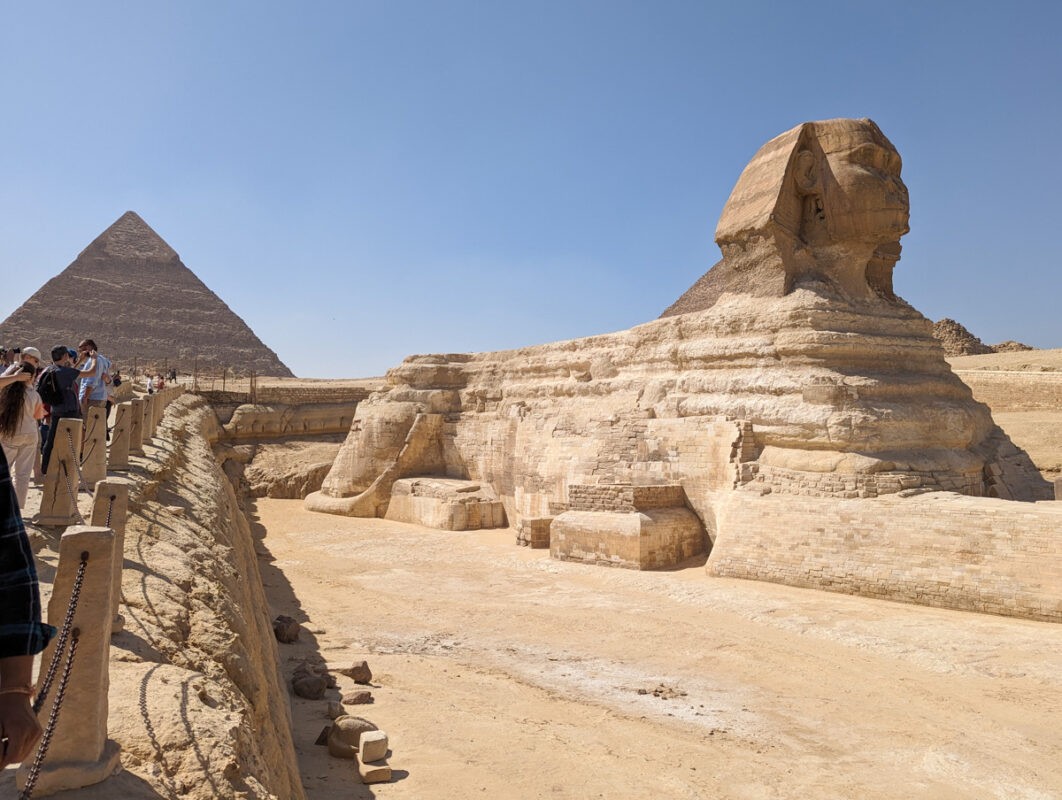Cairo is a lot of things. Hot, dusty, noisy, overwhelming… but is it safe?
Generally, while there’s a lot going on in the city, it’s a safe place for travel. However, there’s plenty to be mindful of, especially if you’re visiting as a solo female traveller.
I’ve visited Cairo twice; once when I was a teenager with my family (my dad’s well-travelled but also very cautious about safe destinations, and he deemed it suitable to take myself and my younger sister to back in 2010!), and more recently for a few days with my partner.
I haven’t been a solo female traveller here, but in this post, I’ll offer my perspectives about the city as a whole.
Is Cairo safe?
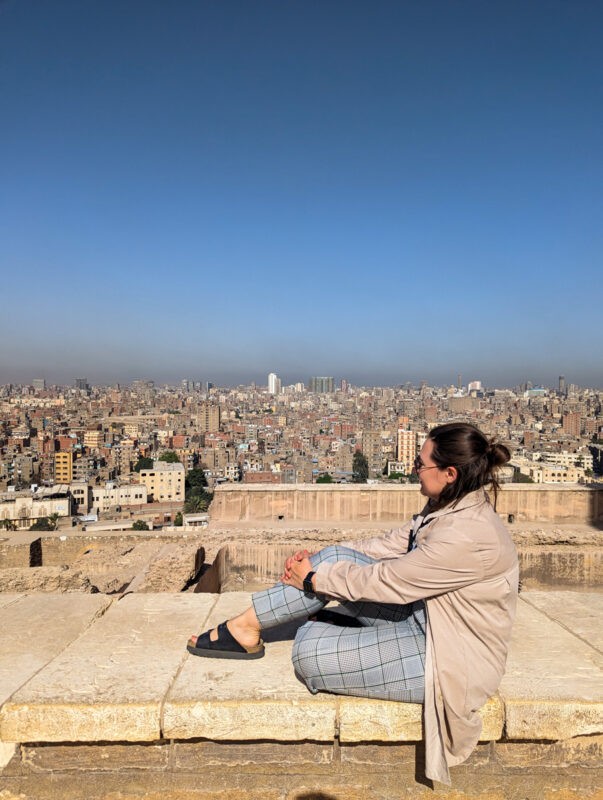
I would say that Cairo is safe, provided you take precautions and wise up on common scams.
Like any large city, petty crime does happen, but this can easily be avoided by locking up valuables and not carrying around large amounts of cash.
Traffic is chaotic, and it’s important to be especially careful when you cross the road.
There are a few extra things for female travellers to think about – particularly solo female travellers – although the huge majority of Egyptian people are friendly and helpful.
There is a small risk of terror attacks and violent crime – as is the case for many cities around the world, including those in Western Europe.
Scams in Cairo
The main issue that tourists face in the Egyptian capital is scams. This isn’t really something that’ll make anyone feel at risk, but it can add a layer of frustration to exploring the city.
Egypt’s a budget-friendly country with an enormous tourist industry. Scams are common in large, tourist-focused cities all over the globe, and Cairo’s no exception!
Here are some of the scams that we either experienced or were warned against while we were exploring Egypt.
Hotels
When we checked into our first hotel, we were initially taken to another guesthouse down the road.
This was a completely different hotel. The room was different, the rooftop terrace (which is why I’d booked that particular hotel) was much smaller, and it didn’t have WiFi.
After some back and forth (the guy working at the hotel said he’d get us Egypt SIMs, which we already had, but we wanted WiFi as we work online).
The entire conversation was very frustrating; the guy working at the hotel was patronising (more about that in the female travel in Cairo section!) and we were made to feel unreasonable for wanting to stay at the hotel that we’d originally booked.
We eventually ended up in a room at the original hotel, but the bathroom hadn’t been cleaned.
None of this particularly made me feel unsafe, but it was rather frustrating!
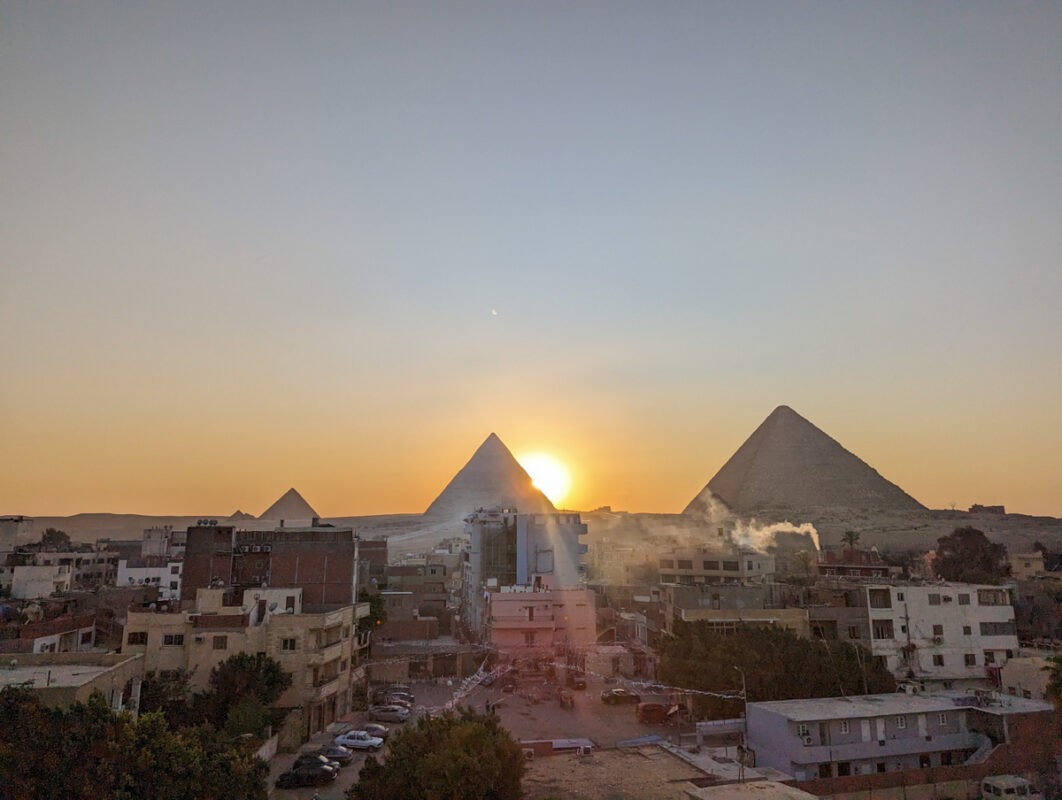
Be wary of papyrus and perfume museums
If you take a tour in Cairo, you’re likely to be taken to a papyrus or perfume museum.
These are more elaborate tourist shops. You’ll be shown the process of making the products, be given a drink (confirm that this is complimentary) and then be invited to buy something.
Generally, you can just walk out of these shops if you don’t wish to buy anything. We did actually purchase some painted papyrus because we didn’t think the price was too bad and liked the idea of getting them as presents for people back home.
However, we weren’t in the market for any perfume; the owner was ok with us not buying anything, but we did feel a little awkward about it!
Don’t take photos of people
Generally, I’d always advise people to not take photos of people in any part of the world without permission (and if you’re going to post the photo online, make sure that they’re aware of that too!).
At tourist sites in Egypt, I’d recommend avoiding taking photos of people who are holding camels or wearing traditional clothing. Generally, any photos of or with them will incur a fee – and they may become annoyed if you take one and refuse to pay. This also applies to any animals that people are holding!
Mosques and churches are free
Mosques and churches are virtually always free throughout the whole of Egypt, including Cairo. If anyone asks for a fee to enter a mosque, it’s likely a scam.
Non-Muslims are welcome at most mosques in Cairo too! Just make sure you cover up, be mindful of whether people are praying, keep the noise down and (again) don’t take any photos of people.
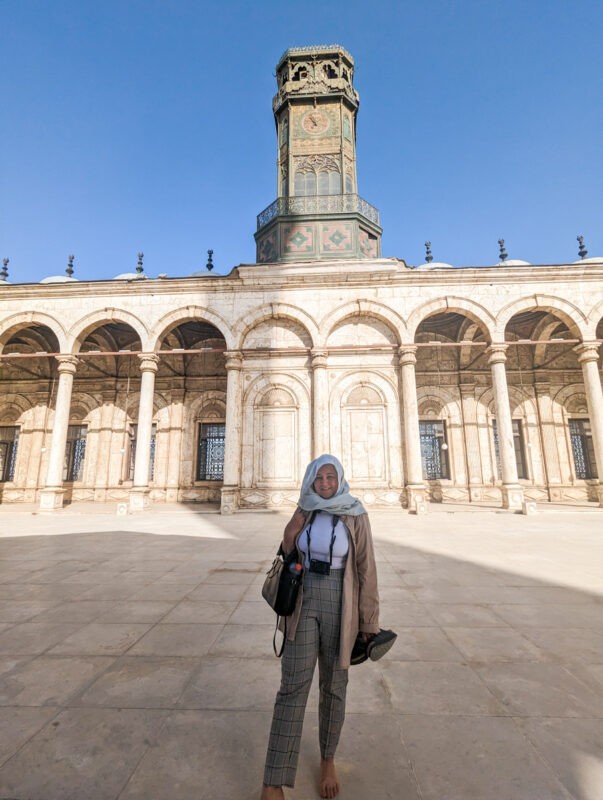
Haggle for taxi rates
Taxi rates in Cairo can be elevated – generally when drivers see a tourist, they may bump up the price.
You can haggle this down, but you might find it difficult – we experienced this in Tunisia and subsequently didn’t try to use taxis in Cairo (apart from one to the Novotel Cairo Airport which cost us the equivalent of £5/ $7 for a five minute ride!).
We avoided using taxis by solely utilising Uber which was very cheap and pre-booking our airport transfers.
Driving in Cairo
While Cairo has a metro system, driving is hectic. Sounds of horns fill the air night and day, and vehicles weave into seemingly impossibly small gaps as traffic intersperses around.
Very few tourists drive in Cairo (and I really wouldn’t recommend it!). We used Uber to get around, which was very easy and affordable – if your card is already set up on the Uber app, you can pay without cash too.
The drivers manage to negotiate the traffic, although sometimes it’s hard to see how!
Do also be very mindful of crossing the road. There aren’t many pedestrian crossings in Cairo; and the ones that do exist often don’t work or are ignored.
You generally just have to look for gaps in the traffic and go through them – it is a nerve-wracking experience, but it’s all part and parcel of travelling in Cairo!
Travelling as a female in Cairo
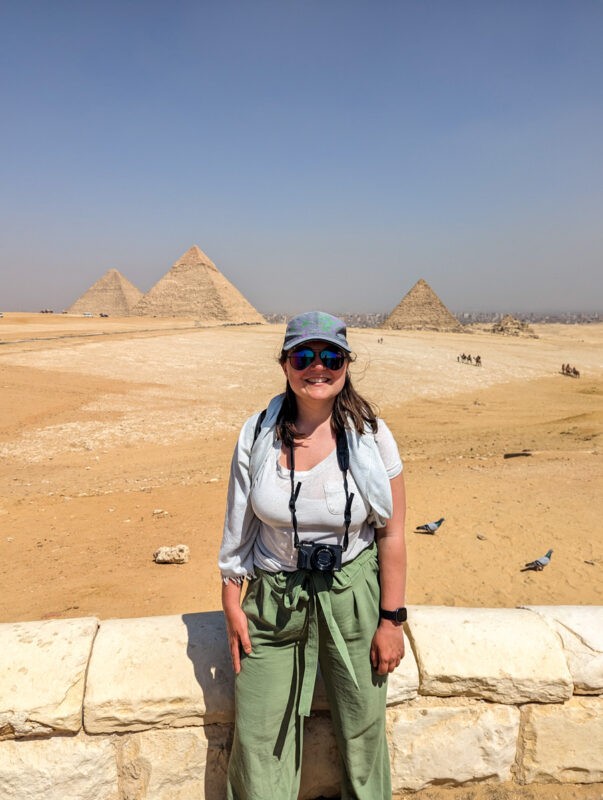
Prefacing this section with the fact that I didn’t travel to Cairo as a solo female traveller (I was with my boyfriend), I have been to lots of other countries on my own (including Kazakhstan, Uzbekistan, all over Turkey and Mexico) and I’ll try to give as best an interpretation of travelling as a female as possible.
95% of Egyptian men that we met were kind and respectful.
Unfortunately, a couple of situations did leave a slightly bitter taste in my mouth and made me question whether I would visit Egypt as a solo female traveller.
One was the hotel that we stayed at in Giza – the one where we were moved to another hotel and there was a lot of back and forth on where we were staying.
After the debacle of working out what room we could stay in, we were relaxing on the rooftop. My partner went down to get something from the room, and immediately, the guy who’d shown us the room and we’d dealt with when we wanted to switch came over.
“Is he your brother?” was the first thing he asked.
“No, he’s my partner” I replied.
“Partner? What do you mean?” he asked me, hovering quite uncomfortably close. “Are you related?”
“No,” I said, more forcefully. “He’s my husband”.
When my partner came up, I informed him that he was now married!
Later on, when we went downstairs to ask for toilet paper (there was none provided in the room), the guy rolled his eyes a lot and made some snarky comments. “I’m just trying to make you happy” he said in a patronizing tone.
“Good, then please can we have some loo roll”, I replied.
Talking over me, he said “is your wife in the mafia?” to my partner.
“What?” he said, confused (about the mafia part, I’d already briefed him on the wife part!).
“Is she your wife?” the hotel guy asked, thinking it was that part he was confused about!
There were a few instances like this; and another guy working at the hotel confidently told us that another female guest (who I think was a solo female traveller) was his girlfriend. Her body language told me that this was not the case!
Unfortunately, this kind of harassment and sexist attitudes aren’t uncommon in Cairo, although I do want to stress, again, that most men here aren’t like this.
While nothing happened, I’m not sure how much the harassment would have been ramped up if I was travelling on my own.
Terrorism in Cairo
While terror attacks could happen in Cairo, they could also occur anywhere in the world. Attacks were more common in 2017 – 2019; just as they were in London and other West Europe capitals at that time.
Today, the risk of terror attacks in Cairo is much lower – in my opinion, the risk is the same level as that of Western Europe.
Incidents are generally more likely (although there’s still a very low risk) in the Sinai region of Egypt (there was an attack in December 2022 here) – they’re localised to particular issues in that area and don’t affect the rest of the country.
How to stay safe in Cairo
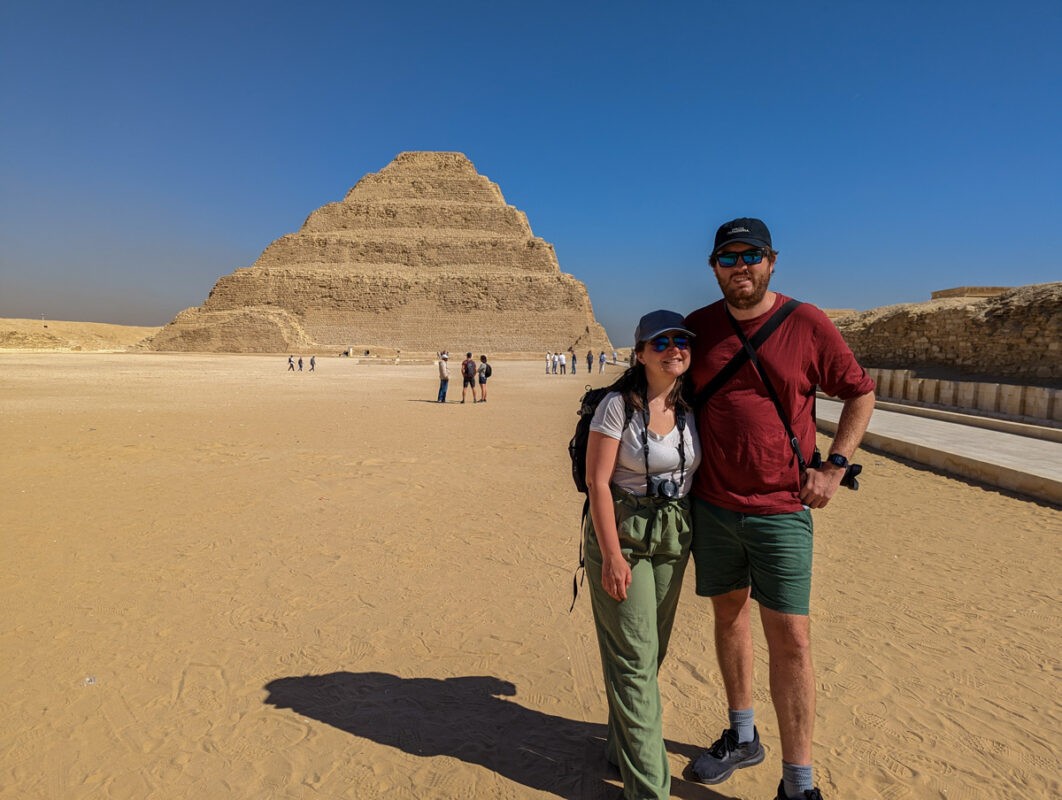
1. Stay in a larger hotel
The most difficult situation that I had in Cairo was in a small guesthouse we booked.
We’d just been on a diving holiday to Sudan and had spent a lot of money, so we were keen to stay in the cheapest (but well-reviewed) place we could find.
That was, we thought, Pyramids Homeland in Giza. It had good reviews on first glance (although some further digging showed me that there were a lot of negative reviews in there too) and the view from the rooftop looked dreamy.
Unfortunately, this is where I experienced the most harassment and made me feel very on edge throughout my stay in Cairo.
To avoid this, I recommend booking a larger hotel with lots of staff members and residents around.
2. Book guided tours for main attractions with well-reviewed companies
You certainly can see tourist attractions like the Pyramids of Giza independently, but I’d highly recommend booking guided tours to help you avoid scams and see them seamlessly. Plus, you’ll learn so much more about the pyramids by visiting with a guide!
3. Buy a SIM card at the airport
We bought a SIM card with 18 GB of data for four euros at the airport. This enabled us to use Uber throughout the city, make use of Google maps, translate to Arabic when necessary, stay connected and look up quick travel tips.
4. Be extremely careful when crossing the road
Crossing the road in Cairo can be a challenge, even for locals. Be extremely mindful when crossing the street, and always use designated pedestrian crossings when possible. Keep an eye out for fast-moving cars and motorcycles, and be prepared to quickly move out of the way if necessary.
5. Use Uber to get around
Uber is widely available in the city – rides cost as little as $0.50, and generally, it’s safer than using taxis.
With Uber, you can see the driver’s name, photo, and car model before you get in (although the numberplates are in Arabic, which makes it a little more tricky to match them up to the app!), and you can track your ride in real-time.
Using Uber also means that you’ll avoid having to haggle!
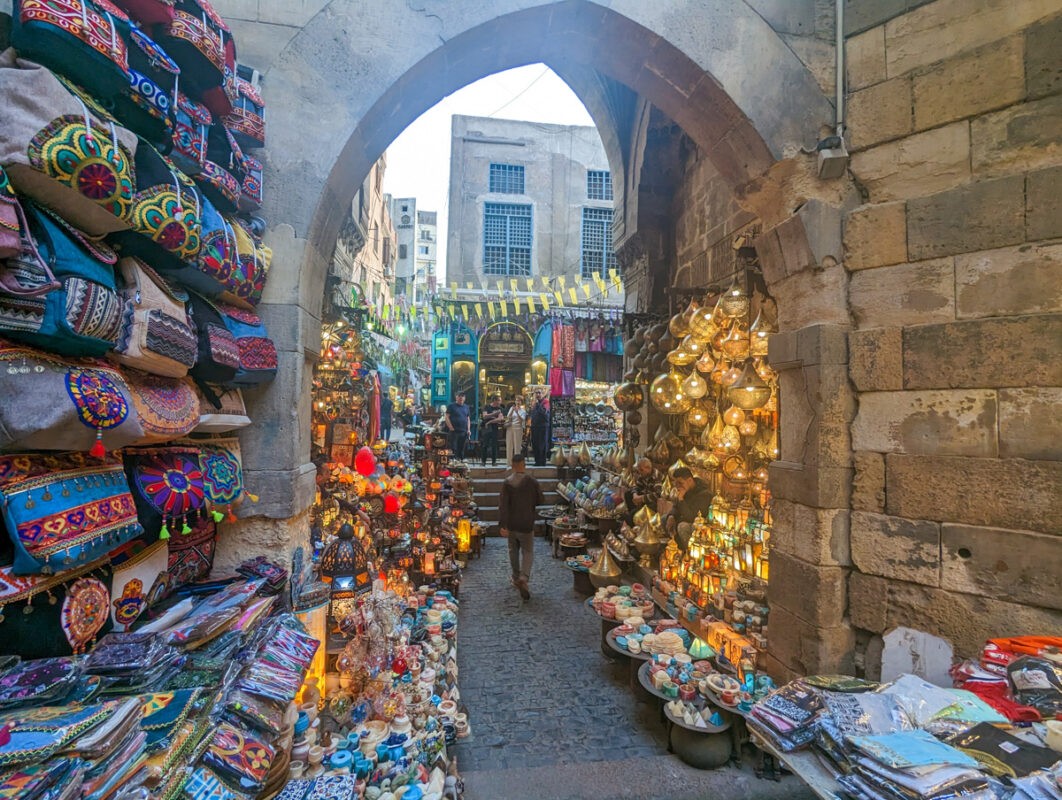
How to stay safe in Cairo
Hot, dusty, chaotic… there’s nowhere quite like Cairo. You’ll step back into layers of history as soon as you enter the city, with stories spanning back to Ancient Egyptian times and further. Its modern culture is vibrant, and with the right precautions, you can easily explore it safely!

